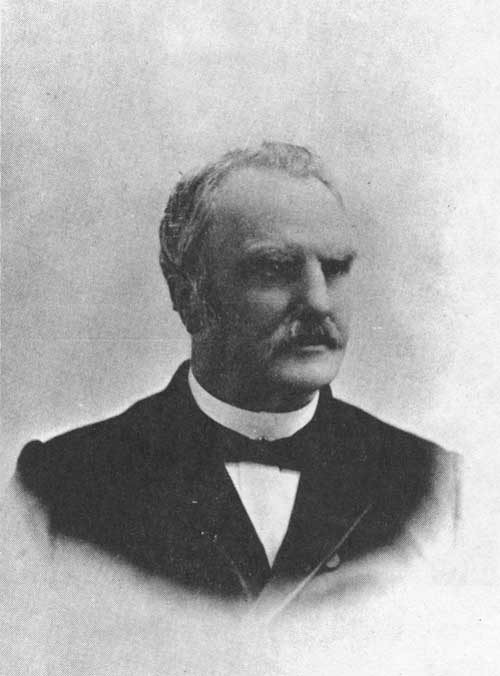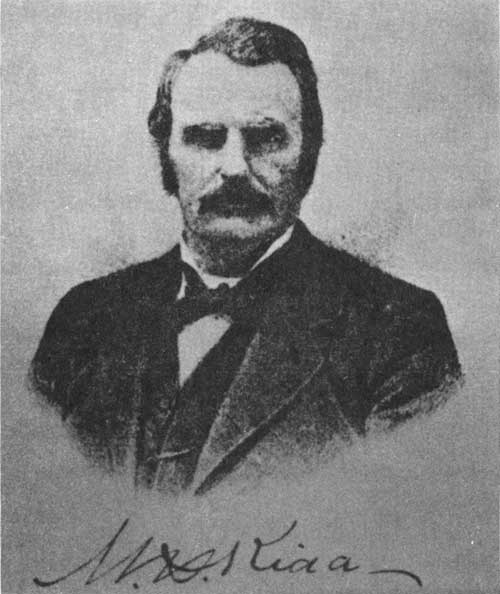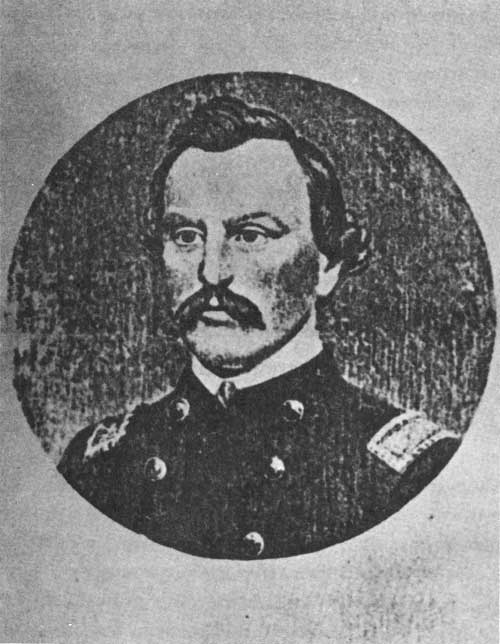|
FORT LARNED
Commanding Officer's Quarters (HS-8) Historic Structure Report Historic Furnishing Study |

|
| HISTORIC FURNISHING STUDY |
ANALYSIS OF HISTORIC OCCUPANTS
The Fort Larned commanding officer's quarters (HS-8), constructed in 1867, stands as a stone structure with later wooden and brick additions. The structural changes occurred during private ownership in the 20th century. [1] Originally, the house had five rooms on the ground floor and a servant's quarters above the kitchen. While an active army post (1867-78), the structure housed the commanding officer and his family.
The time interval 1867-68 has been chosen for purposes of this furnishing study. Maj. Meredith Helm Kidd (figures 1-3) and his family, who occupied the quarters at that time, have been chosen as the inhabitants to be featured. The family, during that interval, included
Meredith - age 36
Millicent (his wife) - age 31
Rose M. - age 8
Edmund S. - age 5
Lelia C. - age 2

|
| 1. Major Meredith Helm Kidd (National Archive photograph No. 391-CA-3B-23) |

|
| 2. Major Meredith Helm Kidd (Photograph from T. B. Helm, History of Wabash County, Indiana) |

|
| 3. Major Meredith Helm Kidd (Photograph from Will Cumback and J. B. Maynard, ed., Men of Progress, Indiana) |
Meredith Kidd's lineage in the United States can be traced back to the 18th century. His grandfather, Edmund Kidd, came from England (Wales) and settled in Carolina County, Virginia, where he married Sarah Jones. Edmund I. Kidd, Meredith's father, was born there in 1793. In 1800 the family relocated to Lexington, Kentucky, and from there Edmund I. migrated to Brookville, Indiana, in 1815. Three years later he changed his residence to Connersville, where he married Christina DeChamp. She had been born in Vermont in 1803 and had moved to Indiana with her parents. This union produced Meredith H., who was born in Connersville, Fayette County, on January 7, 1829. In 1837 the family moved to Miami County, Indiana, and settled on the Eel River northeast of Peru. At age 19 Meredith attended Asbury University in Greencastle, Indiana, for one year. Upon leaving that school in 1849, he read law in Peru, Indiana, and was admitted to the bar in 1851. Settling into a law career at that young age evidently did not agree with Kidd, for in 1852 wanderlust led him to cross the plains to California. After spending five years in the goldfields, where he met with varied success, Meredith returned to Indiana by way of the Panamanian isthmus to New York City. He settled in Wabash, Indiana, and began to practice law. [2]
On November 3, 1857, Meredith H. Kidd married Millicent Fisher. She had been born in 1834 in Fort Wayne, Indiana. Her father, Stearns Fisher, had later moved to Noble Township, Wabash County, where he engaged in farming. Stearns Fisher was wealthy. In 1860 he held real estate valued at $12,200 and personal property worth $10,108. Of the 515 farmers in Noble Township only five held more property and none had more personal wealth. [3] In contrast Meredith Kidd owned real estate worth $800 and personal property valued at $200 in that same year. [4]
In 1860 Meredith Kidd was elected prosecuting attorney for the circuit of Wabash, Huntington, Grant, Miami, Cass, and Carroll counties. The Civil War interrupted his career. With the rank of captain, Kidd organized the 14th Indiana Battery on March 24, 1862. In April of that year, after the Battle of Pittsburg Landing, his battery was attached to Maj. Gen. Henry Halleck, who assigned it to the Army of Tennessee. In the summer of 1862 the battery took part in the siege of Corinth, Mississippi. By November 1862 Kidd rose to the position of chief of artillery on Brig. Gen. Jeremiah Sullivan's staff. Through 1863 he served in various areas of Tennessee. On March 26, 1864, Meredith received an appointment as major with the 11th Indiana Cavalry. He transferred with that group to the command of Maj. Gen. Carl Schurz at Nashville, Tennessee. Here his unit engaged in scouting duty and guarding the railroad. In the fall of 1864 Kidd joined Brig. Gen. George H. Thomas's army and helped prepare the defense of Nashville. He fought in the Battle of Franklin and then the Battle of Nashville. After the latter conflict, Major Kidd joined in the pursuit of the Confederate general John Hood across Tennessee to Eastport, Mississippi. When that chase ended, he and his unit were ordered to Kansas, where Kidd campaigned against the Indians. He operated between Council Grove and Fort Zarah to quell an uprising which centered around the Cheyenne and Arapaho tribes. On June 1, 1865, Kidd was promoted to lieutenant colonel. He was honorably mustered out of the army on September 19, 1865. [5]
Meredith Kidd returned to Wabash and his law practice after the war. In the fall of 1866 he purchased the Wabash (Ind.) Plain Dealer a newspaper which he published until the spring of 1867. In the winter of 1866-67 Meredith was offered a captaincy in the 14th Regular Infantry, but he declined. Within a short time he was tendered the rank of major with the tenth Regular Cavalry. Kidd received tentative notification of his appointment on March 14, 1867, retroactive to March 6 and contingent upon successful completion of an examination administered in Washington, D.C. He traveled to that city, passed the test, and accepted his commission on March 27. Kidd reported to Bvt. Gen. Benjamin Harrison Grierson at Fort Lavenworth and was assigned to command Fort Larned. He arrived at Larned on May 18 and administered that garrison until April 1, 1868. During that period the permanent stone structures were erected, and Major Kidd was the first to inhabit the new commanding officer's quarters. His wife and family accompanied him to Fort Larned, and they continued to reside in Kansas even after he left Fort Larned in April. [6]
In command of six companies of the tenth Cavalry, Major Kidd departed from Fort Larned and proceeded to Fort Wallace via Fort Hays. He remained at Wallace for several months before taking the field in July to participate in an Indian campaign. Between September 25 and November 1868, Kidd left his command in the field and joined his wife to be present for the birth of their fourth child (Alice). When he returned from his leave in November, Kidd was ordered to take command of Fort Arbuckle in Indian territory. He remained at that post until late December, when he left to direct a battalion in the field. Major Kidd arrived at Camp Wachita on March 4, 1869, and stayed there until August, when he took command of Camp Supply, Indian territory. Rejoined by his family, Kidd stayed at that post until October 13, 1870, when he went on leave until November 5 (presumably he returned with his family to Indiana). [7]
In November 1870 Meredith Kidd journeyed to Washington, D.C., where during the month of December he met with a special board, the "Hancock Board" (named after Maj. Gen. W. S. Hancock, the presiding officer) to answer charges leveled by Brevet General Grierson that he was unfit for duty. The main charge, Grierson alleged, was that Kidd neglected his command and spent his time playing cards (blackjack) with his junior officers. This situation had prevailed from the time Kidd had left Fort Larned until he was relieved of duty at Camp Supply. In addition, Grierson considered Kidd to be an inefficient field commander. Halfway through the hearing, Kidd submitted a resignation, and it was accepted on the same day (December 31, 1870) that the board found him fit for service. [9]
Meredith Kidd returned to Indiana for only a short time. From there he traveled to Texas where he bought a herd of cattle and drove them to Kansas. Kidd stayed in that state until the spring of 1873, when he returned to Wabash and again practiced law. On December 19, 1881, his wife, Millicent, died. Less than two years later, on October 17, 1883, he married her younger sister, Harriet Fisher, who lived in Wabash and taught school. In 1884 he stood as the Democratic candidate for Congress in the 11th District of Indiana, but he lost the election. Eight years later Kidd accepted an appointment as a member of a commission to the Five Civilized Tribes in Oklahoma Territory. After serving in that capacity for 1-1/2 years, he resigned to take a position with a mission to the Ute Indians in southwestern Colorado. With the conclusion of his work in that state, he returned to Wabash in the winter of 1895 to resume his law practice. Kidd evidently retired from law soon after 1900 and spent his time between a farm he owned in Arkansas and Wabash. He died on June 11, 1908, and was buried in the family plot in Falls Cemetery, Wabash, Indiana. [10]
Meredith and Millicent Kidd had six children--five girls and a boy. Two girls were born after they had departed from Fort Larned and one, Enrica, died in infancy. Rose M., the first, was born in 1859 and married Edmund Burke Beere, a lawyer. They had three sons--Donald Meredith, born in Albuquerque, New Mexico, in 1886, Stearns, and Robert. Rose attended the Women's Medical College of Chicago and practiced medicine in Chicago, Saint Paul, and Denver. During the Spanish-American War, she served as a nurse in the Red Cross and government hospitals in the Philippines. She had volunteered to go to the Philippines as a doctor, but the army refused to permit female doctors to serve in its hospitals, so her only alternative was to enroll as a nurse. Once there, she began a controversy with her campaign to improve the poor-quality rations served to the enlisted men. After the war, Rose returned to Denver where she became medical inspector of the Denver Public Schools and then superintendent of Denver General Hospital. Upon leaving public life, she operated a private sanatorium in Denver until the United States entered World War I. At that time Rose opened her doors to disabled soldiers. Soon after the war she retired and eventually moved to Washington, D.C., where she died on May 19, 1927. [11]
Meredith and Millicent's only son, Edmund Stearns, was born in 1862. As far as can be determined, he never married. At about age 20 he moved to California for a time and then located in Monterrey, Mexico, where he worked for the rest of his life as a passenger conductor on the Mexican National Railroad. He died in late February 1911 in Monterrey. [12]
Lelia C., the third child, was born in 1865. She married Thomas A. Noftzger and had two children--Mlllicent and Lee. They first lived in Anthony, Kansas, but subsequently moved to Wichita. [13]
Alice, born in 1868, never married. She attended the Indiana Normal School and became a schoolteacher. In 1908 Alice was living in San Francisco. By 1927 she resided in Los Angeles. [14]
Helen M., the last child, was born in 1871. She also attended the Women's Medical College of Chicago and became a doctor. Helen and her husband, Thomas O. McIlvaine, lived in Huntington, Indiana. They had one child--Meredith. Helen died on June 18, 1913, while visiting her sister Rose in Denver. [15]
| <<< Previous | <<< Contents>>> | Next >>> |
hsr-hfs/hfs-sec1.htm
Last Updated: 18-Sep-2009